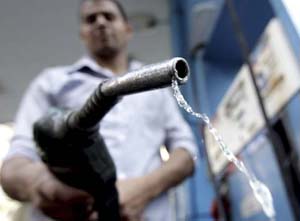 New Delhi, Mar 1: Petrol price was today hiked by 60 paise a litre, the second increase this year, and diesel by 50 paise per litre, the 14th hike since January 2013.
New Delhi, Mar 1: Petrol price was today hiked by 60 paise a litre, the second increase this year, and diesel by 50 paise per litre, the 14th hike since January 2013.
The hikes, effective from midnight tonight, are excluding local sales tax or VAT and actual increase will be higher and will vary from city to city.
Petrol price, which was last hiked by 91 paise on January 4, will cost Rs 73.16 a litre in Delhi from midnight tonight, up 73 paise from Rs 72.43 at present.
In Mumbai, the fuel will cost Rs 82.07 a litre as against Rs 81.31 at present.
The price of diesel in Delhi will be hiked by 57 paise, including tax, to Rs 55.48 per litre, while it will cost Rs 63.86 a litre in Mumbai as against Rs 63.23 at present.
Announcing the price hike, Indian Oil Corp , the nation's largest fuel retailer, said petrol price has been hiked because international oil rates have risen and rupee depreciated against US dollar, making imports costlier.
The diesel price increase is in line with the January 2013 decision of the government to raise rates by up to 50 paise per month till such time that the entire losses on the fuel are wiped out, and prices made market determined.
IOC said even after the 14th price hike since January 2013, the oil companies are incurring Rs 8.37 per litre loss on sale of the fuel.
Since January 2013, diesel rates have risen by a cumulative Rs 8.33.
Besides diesel, oil firms are losing Rs 36.34 a litre on sale of kerosene through public distribution system (PDS) and Rs 605.50 on every 14.2-kg domestic cooking gas (LPG).
IOC said in a statement: "The price of petrol was last revised upwards by Rs 0.75 a litre (excluding state levies) with effect from January 4, 2014.
"Since the last price change, international prices of gasoline (petrol) have increased from USD 116.04 per barrel to USD 118.10, and the rupee has also depreciated from Rs 62.02 to a US dollar to Rs 62.12."
The combined impact of both these factors, has warranted the increase in petrol prices by Rs 0.60 per litre, excluding state levies.
In pursuant to the Government of India's order dated January 17, 2013, oil marketing companies have been authorized to increase the retail selling price of diesel (retail) within a small range every month until further orders.
IOC said it is likely to end the 2013-14 fiscal with an under-recovery or revenue loss of around Rs 74,000 crore on sale of diesel, LPG and kerosene (industry around Rs 1,43,000 crore).
"The movement of prices in international oil market and Rupee-USD exchange rate is being closely monitored and developing trends of the market will be reflected in future price changes," it added.





Comments
Add new comment